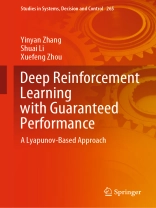This book discusses methods and algorithms for the near-optimal adaptive control of nonlinear systems, including the corresponding theoretical analysis and simulative examples, and presents two innovative methods for the redundancy resolution of redundant manipulators with consideration of parameter uncertainty and periodic disturbances.
It also reports on a series of systematic investigations on a near-optimal adaptive control method based on the Taylor expansion, neural networks, estimator design approaches, and the idea of sliding mode control, focusing on the tracking control problem of nonlinear systems under different scenarios. The book culminates with a presentation of two new redundancy resolution methods; one addresses adaptive kinematic control of redundant manipulators, and the other centers on the effect of periodic input disturbance on redundancy resolution.
Each self-contained chapter is clearly written, making the book accessible to graduate students as well as academic and industrial researchers in the fields of adaptive and optimal control, robotics, and dynamic neural networks.
विषयसूची
A Survey of Near-Optimal Control of Nonlinear Systems.- Near-Optimal Control with Input Saturation.- Adaptive Near-Optimal Control with Full-State Feedback.- Adaptive Near-Optimal Control Using Sliding Mode.- Model-Free Adaptive Near-Optimal Tracking Control.- Adaptive Kinematic Control of Redundant Manipulators.- Redundancy Resolution with Periodic Input Disturbance.
लेखक के बारे में
Yinyan Zhang received his B.E. degree from Sun Yat-sen University, China. He is currently a Ph.D. student at the Department of Computing at The Hong Kong Polytechnic University. His main research interests include nonlinear systems, dynamic neural networks, and robotics. He has authored or co-authored more than 40 scientific papers, including 17 IEEE transaction papers.
Dr Shuai Li received his B.E. degree in Precision Mechanical Engineering from Hefei University of Technology, China, in 2005, his M.E. in Automatic Control Engineering from University of Science and Technology of China in 2008, and his Ph.D. in Electrical and Computer Engineering from Stevens Institute of Technology, USA, in 2014. He is currently working at the Department of Computing at The Hong Kong Polytechnic University. He has been involved in research on and application of neural networks/dynamics for over 10 years, and has published numerous scientific works of various types, including morethan 50 IEEE transactions papers, and 60 SCI-indexed papers. He is now serving as an associate editor of the International Journal of Advanced Robotic Systems, Frontiers in Neurorobotics, Neural Processing Letters, and the Journal of Rehabilitation Robotics. He is also an editorial board member of the International Journal of Distributed Sensor Networks and Neural Computation & Applications. His main research interests include neural networks, robotics, control of networked systems, computation and optimization.
Dr Xuefeng Zhou received his master’s and Ph.D. degrees in Mechanical Engineering from the South China University of Technology, Guangzhou, China, in 2006 and 2011, respectively. He was a Postdoctoral Fellow at the School of Automation Science and Engineering, South China University of Technology, from 2012 to 2013. He is currently the Team Leader of the Robotics Group, Guangdong Institute of Intelligent Manufacturing, Guangdong Academy of Science, Guangzhou. Hisresearch interests include motion planning and force control. Dr Zhou was a recipient of the Best Student Paper Award at the IEEE International Conference on Robotics and Biomimetics in 2010.












